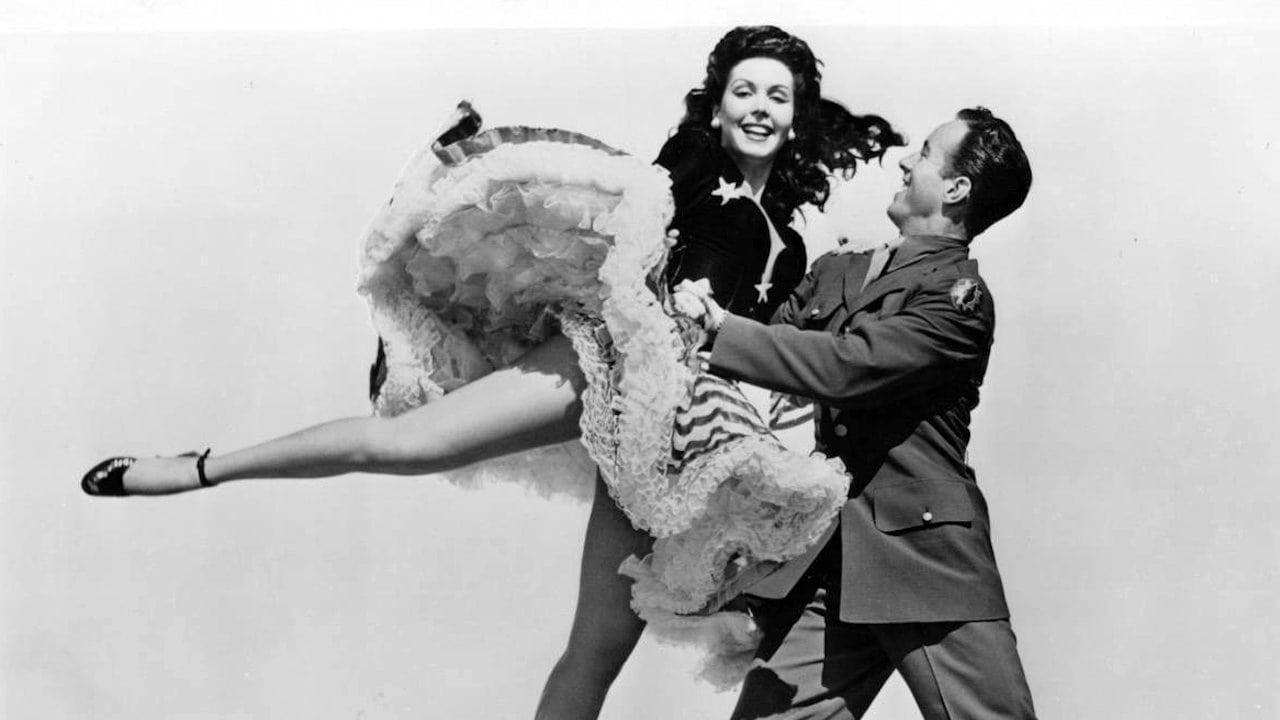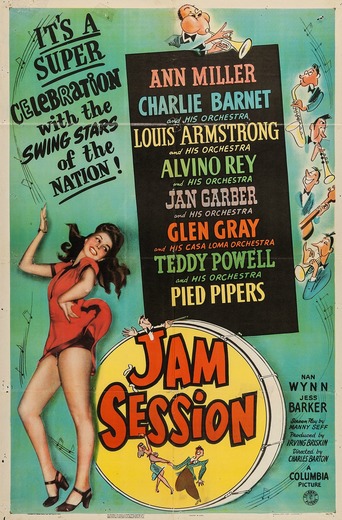

Tap dance contest winner Ann Miller arrives in Hollywood hoping to get a studio contract and become a movie musical star. That's pretty much it for plot in addition to western star Jess Barker's interest in her. Like Reviles with Beverly, this is a collection of musical numbers collected into a single plot line, but when you got the amount of talent that this film engages, the results are going to be extremely entertaining to say the least. Being World War 2, the housing shortage is on, even in Hollywood and Annie has a hysterical predicament and trying to find a room which leads to the discovery of the one that is available. Louis Armstrong has a cameo at the beginning singing I can't give you anything but love, which Annie would later sing with Mickey Rooney on Broadway in Sugar Babies. There's a hysterical sequence where she disguises herself as an old lady to sneak into what is presume to be Columbia Studios to get an audition, and revealed herself to be wearing very little makeup even under her disguise. Practically every musical had a polka to go with it, and here it's the Victory Polka which is the lavish finale to end the film. Not a classic, but certainly a step above many of the be budgeted music homes that were coming out during the war. Annie is charming and is surrounded by a fun supporting cast. I really like Renee Riano who plays her hatchet- face landlady. She is a Margaret Hamilton / Mary Wickes type character actress that deserves more recognition then she has gotten.
... View MoreI always used to wish Ann Miller had found herself at MGM earlier in her career but after viewing a few of these Columbia gems I don't think MGM could have used her more advantageously. Sure the story lines were juvenile and she usually only got to dance at the end of the movie but my, what dances!!! They were always spectacular and used her quick, rhythmic tapping to great advantage - And the movies themselves were filled with the top bands and singers performing their latest hits!!!The film starts off with a bang - the fabulous Louis Armstrong and his rendition of "I Can't Give You Anything But Love", obviously slotted in at the beginning so it could be discreetly removed for some Southern audiences. The story, such as it was, involved a dancing contest winner, Terry (a vibrant Ann Miller) storming Hollywood then realising she is just a small fish in a big pond. The eight musical numbers, to be fair, are incorporated into the plot ie a taxi driver turns on his radio and suddenly there is the Jan Garber Orchestra performing "I Lost My Sugar in Salt Lake City"!! With a passing nod to the wartime housing shortage, Terry wangles herself into a secretarial job with George Haven (Jess Barker), an up and coming script writer for "Superba Pictures", even though she doesn't know the first thing about taking shorthand. "You're easy on the eyes" George coos and she certainly is!! Another musical break with the Alvino Rey Orchestra taking a novel approach to "St. Louis Blues" featuring a steel guitar no less. Another novelty song "Murder, He Said" is given a feisty rendition by vocalist Peggy Mann to her zoot suited romeo, backing by the Teddy Powell Orchestra and yet another singing interlude featuring The Pied Pipers showing they were never as good once Frank Sinatra left them.In between acts the story progresses - George dictates a sure fire story but because Terry can't take shorthand she doodles, then has to hire a stenographer while she dictates what she remembers. The finished product is pronounced very amateurish ie "we ate tons and tons of ice cream", George loses his job and Terry pours out her woes to a nice tramp in the park, who just happens to be the head of the studio. Terry and George go dancing to the Glen Gray and His Casa Loma Orchestra with "No Name Jive". There is a very limp rendition of "Cherokee" by Charlie Barnett's Orchestra but "Brazil" as sung by Nan Wynn is more like it - you can't go wrong with "Brazil". Terry finally gets an audition but when they enthuse she thinks they are making fun of her and she storms out, fortunately she storms back for a scintillating finale "Vict'ry Polka" and I agree with another reviewer, if only she had been given a couple more dances at the expense of some of the bands.Jess Barker didn't have a huge career - his wife's left him completely in the shade - she was Susan Hayward!!!
... View MoreCopying the format used in Ann Miller's previous film, "Reveille With Beverly", once again the plot is an excuse to piece together musical performances by popular recording artists of the day.Nevertheless, it's an opportunity to enjoy the lovely Miller, who was only in her early 20s at the time of filming. I read that Dorothy Parker was once quoted as saying Miller "was the most statuesque broad in Hollywood". While she dances only once, it's a nice production number with a World War II theme. She remarked in her autobiography that her Columbia films were intended as entertainment of the troops.
... View MoreAnn Miller shines in this oft-used tale playing a small town girl trying to break into Hollywood.This is a movie about making a movie. Not any movie, mind you, but this movie, a movie named "Jam Session." A writer is hired to write a plot to tie together performances by several big bands, not true jam sessions, however, or even staged ones, but rather numbers performed and filmed for the movie within the movie (making the title a bit of a misnomer).Ann's character carries a letter of introduction to the head of the studio which just happens to be the one making Jam Session, but she can't get past the door. Not one to give up, she attempts to get into the studio by whatever means, including posing as secretary to the movie's screenwriter. (It's a bit of fun watching her character trying to figure out a typewriter.)As for the musical numbers, they kick off with one by trumpet master Louis Armstrong. A couple of throw-away novelty numbers follow, but pick up again with the Pied Pipers, a perennial favorite, and with Nan Wynn, the vocalist featured in the opening credits. Naturally, without belaboring the plot points, everything works out in the end with a production number featuring our gal Ann.
... View More